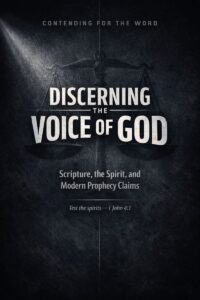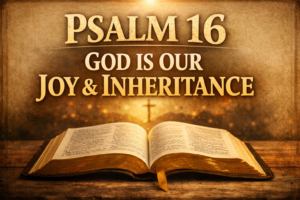⏱️ Estimated Reading Time: 5 min read
In every age of the church, orthodox believers have ascribed to two doctrines which may seem, at first glance, to be contradictory to one another: that is, that God is both a God of mercy and justice.
Thoughtful believers have pondered the apparent tension these two attributes seem to create. How can God show mercy to sinners, when His justice requires that sin and sinners be destroyed? How can a God of mercy forgive sinners without impairing the exercise of His justice?
The Temptation to Favor One Attribute Over the Other
“All mercy, no justice” creates a gospel without accountability. “All justice, no mercy” offers no hope to the broken.
For example, some churches and denominations pride themselves on their willingness to show grace and overlook sin. But with this often comes a hesitance to speak truth and hold members accountable. All mercy, no justice.
At the opposite extreme, there are churches that seem to specialize in speaking the truth devoid of love. Westboro Baptist Church is a tragic example, whose stance against homosexuals became known through protesting funerals and attending gay pride parades with signs that say, “God hates fags.” All justice — no mercy.
In both of these examples, the tension between the two divine attributes is resolved by eliminating one of them.
When Justice and Mercy Are Pitted Against Each Other
Another attempt to resolve this apparent tension is to retain God’s justice alongside His mercy, but to pit the two against each other — as though God’s justice is an inconvenient hindrance to the exercising of His mercy.
At this point, we should ask: What does the Bible say about the relation of God’s mercy to His justice, and how do the two relate to one another in salvation?
Justice and Mercy at the Cross (Romans 3:24–26)
Paul has been laboring, up to this point in Romans, to show that every person — Jew and Gentile — has sinned and become guilty before God (Romans 1:18–2:29; 3:9).
Attempting to remedy this by obeying the law does not help but hinders, since the law points out sin (Romans 3:20) and increases it (Romans 5:20). We are by nature separated from God and under His wrath.
But through the gospel, we can be justified (declared innocent) — by grace through faith in Jesus (Romans 3:24), with total forgiveness and new life (Romans 6:1–8:17).
This comes “through the redemption which is in Christ Jesus” (Romans 3:24b). His death paid the ransom that frees us from the penalty of sin.
How Can God Forgive and Still Be Just?
If God forgives without punishing sin, He violates His own nature (Romans 12:19; Hebrews 10:30; Genesis 18:25). Proverbs 17:15 declares:
“He who justifies the wicked and he who condemns the righteous are both alike an abomination to the Lord.” — Proverbs 17:15, ESV
A just God cannot simply overlook evil any more than a judge can acquit a murderer or terrorist.
Propitiation: Where Wrath Meets Mercy
Romans 3:25 introduces the concept of propitiation — a blood sacrifice that satisfies God’s wrath and makes Him favorable toward us.
God displayed Christ as a “propitiation by His blood.” Jesus bore our sin and absorbed God’s wrath in full. Not deflected — absorbed.
“There is therefore now no condemnation for those who are in Christ Jesus.” — Romans 8:1, ESV
Just and the Justifier
Sinners are pardoned, and sin is punished. God remains just and becomes the justifier:
“So that He might be just and the justifier of the one who has faith in Jesus.” — Romans 3:26, ESV
Justice is satisfied, and mercy is extended — all in the person of Christ.
The Cross Resolves the Tension — Forever
We no longer need to minimize or choose between mercy and justice. The cross satisfies both. God’s attributes are not in tension — they are fully expressed in Christ’s atoning work.
Why This Is Good News
1. God’s justice means evil will not go unpunished.
God’s justice means we live in a moral universe. He “passed over” sins (Romans 3:25) in forbearance but has now acted publicly in the cross.
2. God’s mercy means sinners can be forgiven.
If we trust in Christ, our sin no longer defines us. God has compassion and offers full forgiveness (2 Peter 3:9).
“Mercy and truth have met together; righteousness and peace have kissed.” — Psalm 85:10, NKJV
This frees us to follow the Savior who came full of “grace and truth” (John 1:14).
📖 Frequently Asked Questions
❓ How can God be both just and merciful?
God’s justice requires that sin be punished, while His mercy extends forgiveness to sinners. The cross of Christ is where these two truths meet. At the cross, Jesus bore the full penalty for sin, satisfying God’s justice, while making a way for mercy to be shown to all who believe (Romans 3:24–26).
❓ What does “propitiation” mean in Romans 3:25?
Propitiation refers to a blood sacrifice that satisfies divine wrath. In Romans 3:25, Paul uses this term to describe Jesus’ sacrificial death, which turned away God’s just wrath by paying the penalty for our sin. This allows God to be favorable toward sinners who place their trust in Christ.
❓ Why is it important that God remains just when forgiving sinners?
If God were to overlook sin without punishing it, He would violate His own just nature (Proverbs 17:15). But in the gospel, God punishes sin in Christ, allowing Him to be both “just and the justifier of the one who has faith in Jesus” (Romans 3:26). This upholds His righteousness while offering true forgiveness.
Dustin has been the senior pastor at Buffalo Baptist Church of Shelby, NC since 2020. He received a Master of Divinity in Advanced Biblical Studies from Southeastern Baptist Theological Seminary in 2012 and a BA in music from Brevard College in 2003. At Southeastern, Dustin studied Biblical Hebrew extensively and received the R.T. Daniel Old Testament Award. Dustin is married to the love of his life, Shannon, and together they have two children: Noah and Abigail. Dustin’s ministry passions are discipleship, pastoral care, and preaching sermons that explain the Bible and engage people of all ages. In his spare time, he enjoys reading, running, and spending time with his family.




